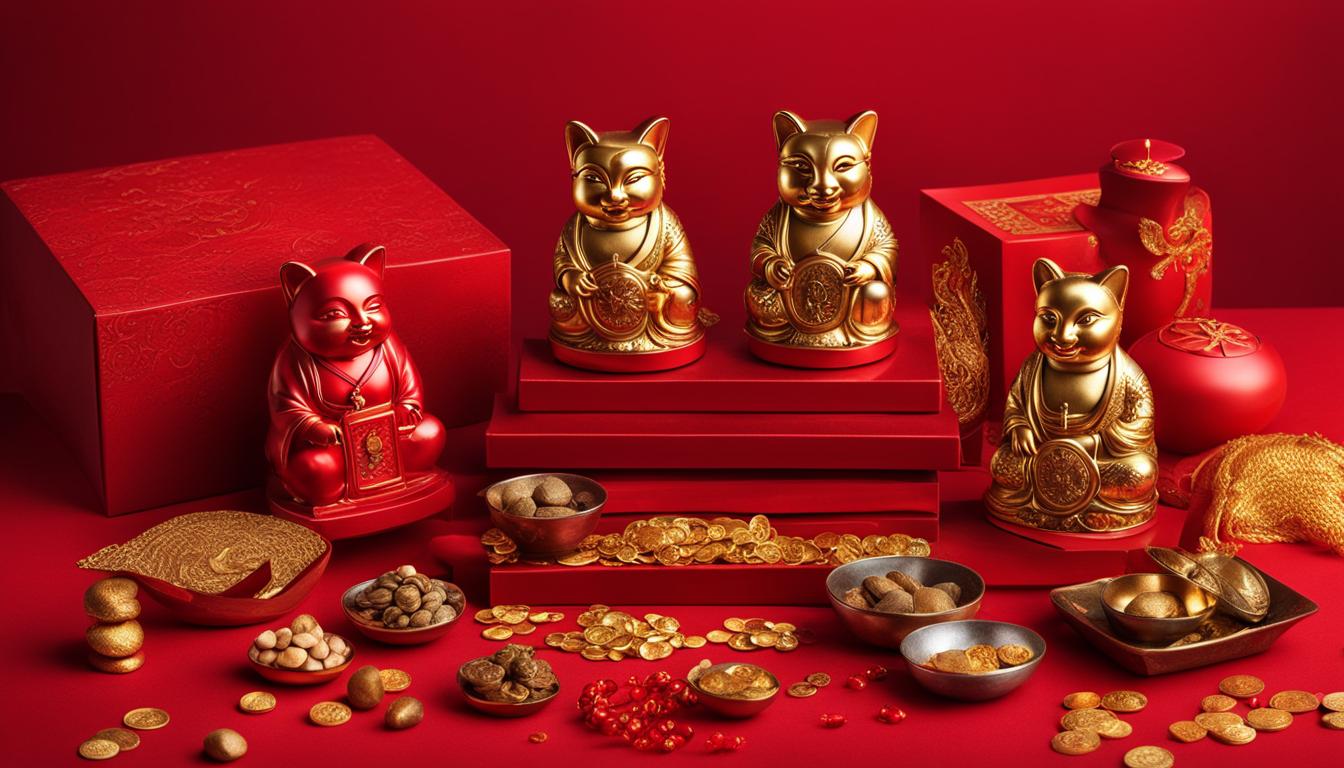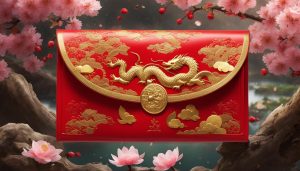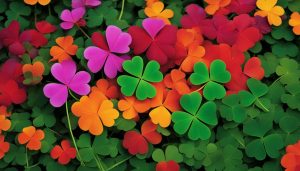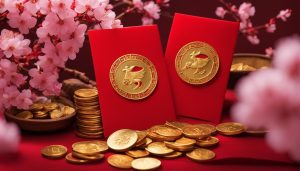In Chinese culture, good luck and fortune are often associated with symbols and charms. These traditional Chinese good luck charms hold significant cultural meaning and are believed to bring positive energy into people’s lives. Let’s explore some of the items that China considers to be lucky charms and the cultural significance behind them.
Contents
- 1 The Color Red (红色 / hóngsè)
- 2 Dragon (龙 / lóng)
- 3 Tortoise (乌龟 / wūguī)
- 4 Chinese Puns
- 5 Lucky Numbers
- 6 Chinese Knot
- 7 Conclusion
- 8 FAQ
- 8.1 What are some traditional Chinese good luck charms?
- 8.2 What is the significance of the color red in Chinese culture?
- 8.3 What is the cultural significance of dragons in Chinese culture?
- 8.4 What is the symbolism behind the tortoise in Chinese culture?
- 8.5 Why are puns and wordplay important in Chinese culture?
- 8.6 What numbers are considered lucky in Chinese culture?
- 8.7 What is the significance of Chinese knots as good luck symbols?
- 8.8 What is the cultural significance of Chinese lucky symbols?
- 9 Source Links
Key Takeaways:
- Chinese culture has a rich tradition of using symbols and charms for good luck.
- Items such as the color red, dragon, tortoise, Chinese knots, and lucky numbers hold special significance.
- Chinese puns and wordplay are common in lucky phrases for auspicious occasions.
- Certain numbers like six, eight, and nine are considered particularly lucky in Chinese culture.
- Chinese knots are intricate art forms used as symbols of good luck and prosperity.
The Color Red (红色 / hóngsè)
Red is a color that holds great significance in Chinese culture. It is associated with power, status, and confidence. For ordinary people, red represents happiness, wealth, prosperity, and good luck. In Chinese weddings, the bride traditionally wears a red dress, and decorations are adorned with red accents. The color red is also prominently featured during Chinese New Year celebrations, with red envelopes (红包 / hóngbāo) filled with money being given as gifts. The use of red in Chinese culture symbolizes good fortune and positive energy.
https://www.youtube.com/watch?v=lCt-4RxWeog
Red Color Symbolism in Chinese Culture
The color red in Chinese culture symbolizes good luck and positive energy. It is believed to ward off evil spirits and bring good fortune. Red is often used in festive celebrations and auspicious occasions as a symbol of joy and happiness. The association of red with wealth and prosperity has made it a popular color choice for important life events such as weddings and the Chinese New Year. From red lanterns to red envelopes, the color red is an integral part of Chinese traditions and rituals.
“Red is the color of life, and it brings good luck and happiness.”
Lucky Colors in China
In addition to red, there are other colors that are considered to be lucky in Chinese culture. Yellow is associated with royalty and is considered the most beautiful and prestigious color. It symbolizes power, prosperity, and harmony. Gold is also seen as a lucky color and is associated with wealth and abundance. Green represents growth, fertility, and harmony, while white is associated with purity and mourning. Understanding the symbolism of these colors is important when participating in Chinese cultural events and celebrations.
Table: Colors and Their Symbolism in Chinese Culture
| Color | Symbolism |
|---|---|
| Red | Good luck, happiness, prosperity |
| Yellow | Royalty, power, harmony |
| Gold | Wealth, abundance |
| Green | Growth, fertility, harmony |
| White | Purity, mourning |
Understanding the symbolism of colors in Chinese culture can help you appreciate and respect the traditions and beliefs of the Chinese people. Whether it’s decorating your home with red accents or wearing auspicious colors during important occasions, incorporating lucky colors into your life can bring positive energy and good fortune.
Dragon (龙 / lóng)
In Chinese culture, the dragon holds a revered status and is considered a symbol of royalty, strength, prosperity, and auspiciousness. The dragon is deeply rooted in Chinese mythology and is often depicted as a benevolent creature associated with the ruler of the natural elements. It is also one of the twelve animals in the Chinese zodiac, highly regarded for its qualities of courage, intelligence, and good luck.
The dragon’s symbolism in Chinese culture extends beyond its mythical origins. It represents power, resilience, and the ability to overcome challenges. The dragon’s presence is believed to bring good fortune and protect against negative energies. This auspicious creature is often depicted in various art forms, such as paintings, carvings, and statues, and is a popular motif in traditional Chinese architecture.
The dragon’s symbolism is further emphasized during festivals and celebrations. Dragon dances, performed by a team of dancers maneuvering a long dragon puppet, are a highlight of Chinese New Year festivities. The dynamic movements of the dragon are believed to bring prosperity and drive away evil spirits. The dragon’s association with luck and positive energy has made it a beloved symbol in Chinese culture, both in China and among Chinese communities around the world.
| Dragon Symbolism | |
|---|---|
| Symbol | Meaning |
| Power | The dragon represents strength and authority. |
| Prosperity | The dragon is associated with wealth and abundance. |
| Good Luck | Dragons are believed to bring good fortune. |
| Courage | The dragon symbolizes bravery and fearlessness. |
Tortoise (乌龟 / wūguī)
In Chinese culture, the tortoise is considered to be a symbol of longevity and auspiciousness. Its ability to live long lives is associated with longevity, and it is believed to possess spiritual powers. The tortoise is one of the Four Benevolent Animals in Chinese culture, along with the dragon, phoenix, and unicorn.
The tortoise holds a special place in Chinese mythology and is often depicted as a wise and prudent creature. It is believed to bring good luck and protection against evil spirits. The shell of the tortoise is considered to be a powerful protective charm and is commonly used in divination practices by Chinese fortune tellers.
Longevity is highly valued in Chinese culture, and the tortoise is seen as a symbol of a long, healthy, and prosperous life. It represents wisdom, stability, and the ability to withstand hardships. The tortoise is often depicted with a snake or the Chinese character for longevity on its shell, further emphasizing its association with longevity.
| Tortoise Symbolism in Chinese Culture | Meaning |
|---|---|
| Longevity | The tortoise is associated with a long and prosperous life. |
| Wisdom | The tortoise is considered to be a wise and knowledgeable creature. |
| Protection | The tortoise is believed to offer protection against negative energies and evil spirits. |
The tortoise is a revered symbol in Chinese culture, representing longevity, wisdom, and protection. Its significance is deeply rooted in Chinese mythology and traditions. By embracing the symbolism of the tortoise, you can invite positive energy and good fortune into your life. Whether through wearing tortoise-inspired accessories or displaying tortoise figurines, incorporating this lucky symbol can serve as a constant reminder of the importance of longevity and wisdom in your journey.
Chinese Puns
Chinese culture is known for its rich tradition of puns and wordplay. Puns are clever linguistic expressions that play on the similarities in sound or meaning of different words. In Chinese culture, these puns are often used to create lucky phrases that are believed to bring good fortune and positive energy.
One popular example is the phrase “年年有余” (Nián nián yǒuyú), which means “the hope to have surplus wealth or good things every year.” The word “余” (yú) sounds similar to the word “鱼” (yú), which means fish. Fish, in Chinese culture, symbolizes abundance and wealth. By incorporating the word “余” into the phrase, it brings an association with fish and enhances the wishes for prosperity.
During Chinese New Year celebrations, you will often come across these lucky phrases displayed on decorative scrolls or red banners. They are believed to bring good luck and blessings for the upcoming year. It’s a fun and creative way for Chinese people to express their hopes and wishes for a prosperous future.
“年年有余” (Nián nián yǒuyú) – the hope to have surplus wealth or good things every year.
So, the next time you visit a Chinese home or participate in a Chinese New Year celebration, pay attention to the lucky phrases that are shared. You might just learn a new pun and join in the fun of spreading good fortune and positive energy!
Chinese New Year Lucky Phrases
- “吉祥如意” (Jíxiáng rúyì) – good luck and prosperity
- “福禄寿” (Fú lù shòu) – happiness, wealth, and longevity
- “财源广进” (Cái yuán guǎng jìn) – may wealth flow in from all directions
- “岁岁平安” (Suì suì píng’ān) – peace and safety every year
- “万事如意” (Wàn shì rúyì) – may everything go according to your wishes
These phrases are often exchanged as greetings or written on red envelopes that are given as gifts during Chinese New Year. They carry well wishes for prosperity, good health, and happiness.
| Phrases | Meaning |
|---|---|
| “吉祥如意” (Jíxiáng rúyì) | good luck and prosperity |
| “福禄寿” (Fú lù shòu) | happiness, wealth, and longevity |
| “财源广进” (Cái yuán guǎng jìn) | may wealth flow in from all directions |
| “岁岁平安” (Suì suì píng’ān) | peace and safety every year |
| “万事如意” (Wàn shì rúyì) | may everything go according to your wishes |
These lucky phrases not only add to the festive atmosphere but also reflect the wish for prosperity and good fortune in the Chinese culture.
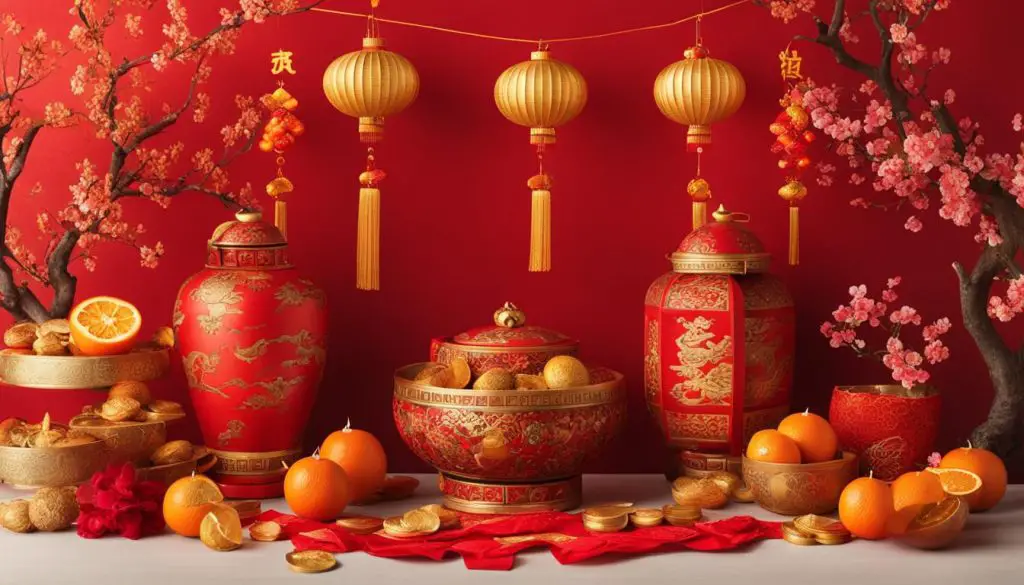
Lucky Numbers
In Chinese culture, numbers hold significant meaning and are believed to bring good luck and prosperity. Certain numbers are considered particularly lucky and are often incorporated into various aspects of daily life to attract positive energy and favorable outcomes.
The Significance of Numbers in Chinese Culture
Chinese culture attaches great importance to numbers and their symbolic meanings. The numbers six, eight, and nine are especially regarded as lucky numbers.
- Six: The number six (liù 六) sounds similar to the word “flow” (liú 流) in Chinese. It is associated with smoothness, harmony, and the continuous flow of good fortune.
- Eight: Considered the luckiest number, eight (bā 八) sounds similar to the word for “wealth” (fā 发) in Chinese. It represents prosperity, wealth, and financial success.
- Nine: Associated with longevity and eternity, the number nine (jiǔ 九) is considered highly auspicious. It is believed to bring long-lasting happiness, good luck, and a sense of completeness.
“In Chinese culture, numbers hold great significance and are believed to influence various areas of life, from business to personal relationships. Incorporating lucky numbers into your daily life can enhance your overall luck and bring positive outcomes.”
Using Lucky Numbers in Daily Life
Chinese people often incorporate lucky numbers into their daily life and decision-making processes. This can be seen in various aspects, including phone numbers, addresses, business names, and even important dates for events such as weddings and business openings.
For example, individuals may intentionally choose phone numbers or addresses with combinations of lucky numbers to attract good fortune. Businesses may incorporate these numbers into their branding and marketing strategies to enhance their chances of success.
| Lucky Numbers | Suggested Meanings or Applications |
|---|---|
| Six | Useful for businesses seeking smooth operations, harmonious relationships, or those involved in the arts. |
| Eight | Commonly used in businesses related to finance, investments, or sales, as it is believed to attract wealth and prosperity. |
| Nine | Considered auspicious for businesses related to longevity, healthcare, or those seeking enduring success. |
“Incorporating lucky numbers into your daily life can be a fun and meaningful way to embrace Chinese culture and attract positive energy. Whether it’s choosing a lucky phone number or incorporating these numbers into your business strategy, the belief in lucky numbers adds a touch of positivity to everyday life.”
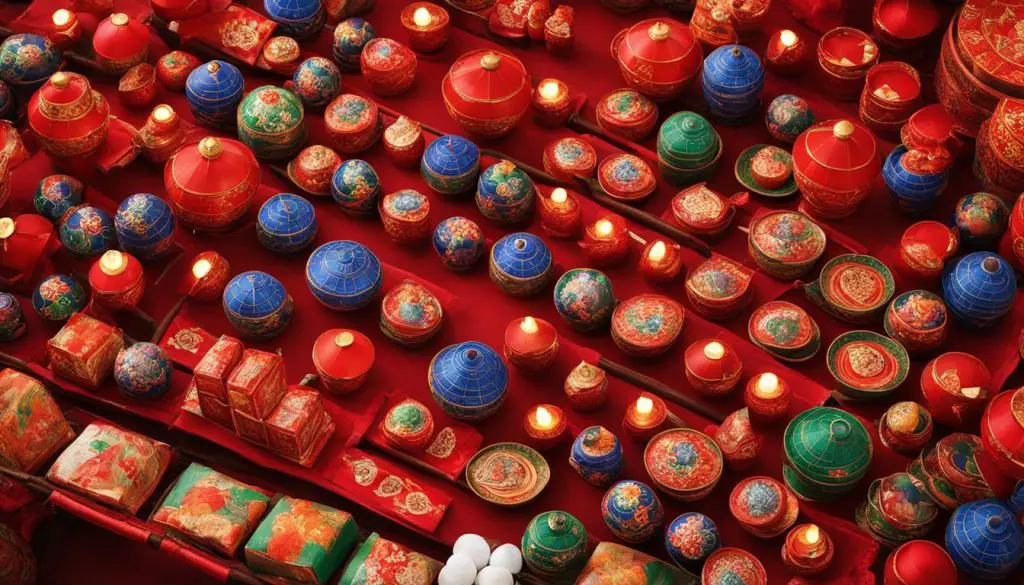
By understanding the significance of lucky numbers in Chinese culture, you can explore various ways to incorporate them into your own life and experience the potential benefits they may bring. Whether you choose to use them in personal or professional settings, these lucky numbers serve as reminders of the positive energy and good fortune you can attract by embracing the rich traditions of Chinese culture.
Chinese Knot
Chinese knots are intricate and beautiful traditional art forms that are used as symbols of good luck and prosperity. Made from a single piece of thread, Chinese knots come in various shapes and designs, each with its own symbolic meaning. Red, the most commonly used color in Chinese knotting, represents good luck and prosperity. Incorporating Chinese knots into your life can bring positive energy and enhance your overall well-being.
Symbolism and Meaning
Chinese knots are deeply rooted in Chinese culture and are believed to bring luck, fortune, and protection from evil spirits. Each knot design carries its own symbolism. For example:
- The Double Coin Knot symbolizes wealth and abundance.
- The Mystic Knot represents a harmonious and everlasting relationship.
- The Clover Knot signifies good luck and happiness.
By displaying Chinese knots in your home or wearing them as accessories, you can attract positive energy and invite good fortune into your life.
Chinese Knotting Art
Chinese knotting art has a long history and is considered a form of decorative craftsmanship. Skilled artisans use intricate techniques to create beautiful knots, showcasing their creativity and craftsmanship. Chinese knotting can be found in various aspects of Chinese culture, including clothing, accessories, home decor, and traditional ceremonies.
“Chinese knotting art is an exquisite expression of Chinese culture. The intricate designs and meticulous craftsmanship make each knot a true work of art.” – Chinese Knotting Master Li Wei
Bringing Chinese Knots Into Your Life
There are many ways to incorporate Chinese knots into your daily life:
- Hang Chinese knots near the entrance of your home to attract good luck and positive energy.
- Wear Chinese knot accessories, such as bracelets or necklaces, to bring luck and protection wherever you go.
- Display Chinese knots as decorative pieces in your living space to create a harmonious and auspicious atmosphere.
Embracing Chinese knot symbolism can add beauty, meaning, and positive energy to your everyday life. Start exploring the world of Chinese knots and experience the magic they bring.
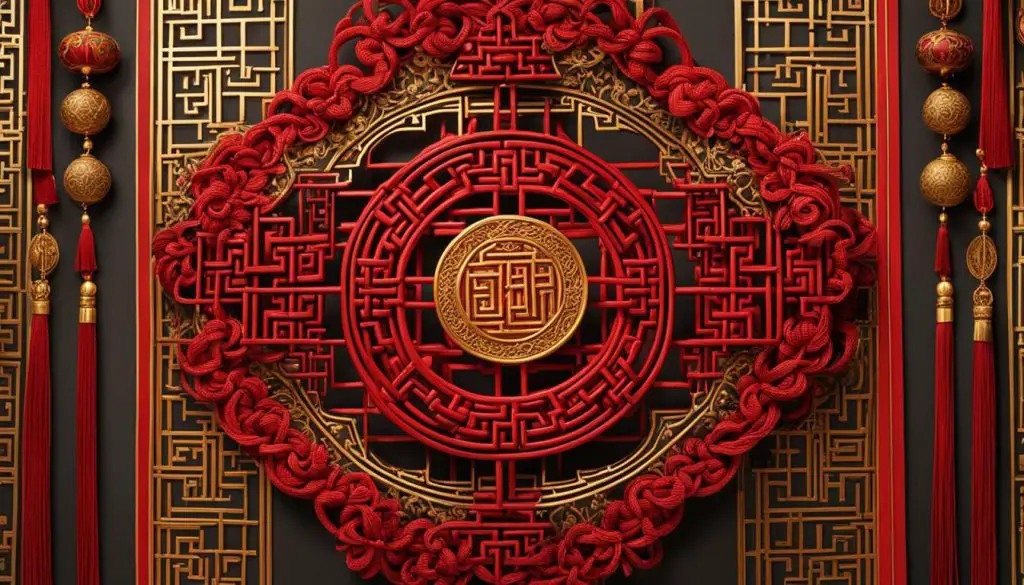
Conclusion
Chinese culture is rich in symbolism and the belief in lucky charms. From the vibrant color red to the mystical dragon and wise tortoise, each symbol carries deep cultural significance. Incorporating these lucky symbols into your life can bring positive energy and good fortune.
Wearing a red dress on a special occasion or displaying a Chinese knot in your home are simple ways to embrace these traditions. By doing so, you invite the magic of Chinese good luck charms into your life.
Remember, these symbols are more than just decorative elements. They represent centuries-old beliefs and traditions that have been passed down through generations. So why not add a touch of luck and cultural significance to your life by embracing the Chinese lucky symbols and good luck charms?
FAQ
What are some traditional Chinese good luck charms?
Traditional Chinese good luck charms include items such as the color red, dragons, tortoises, Chinese knots, and lucky numbers.
What is the significance of the color red in Chinese culture?
In Chinese culture, red symbolizes happiness, wealth, prosperity, and good luck. It is often associated with special occasions like weddings and Chinese New Year celebrations.
What is the cultural significance of dragons in Chinese culture?
Dragons are revered in Chinese culture and are symbols of royalty, strength, prosperity, and auspiciousness. They are considered benevolent creatures and are one of the twelve animals in the Chinese zodiac.
What is the symbolism behind the tortoise in Chinese culture?
The tortoise is seen as a symbol of longevity and wisdom in Chinese culture. It is one of the Four Benevolent Animals and is believed to possess spiritual powers.
Why are puns and wordplay important in Chinese culture?
Chinese people love to use homophonic or double-entendre words to create lucky phrases. These phrases incorporate words that sound similar to positive meanings, bringing greater luck and abundance.
What numbers are considered lucky in Chinese culture?
The numbers six, eight, and nine are considered particularly lucky in Chinese culture. Six represents smoothness and harmony, eight is associated with wealth and prosperity, and nine symbolizes longevity and everlasting.
What is the significance of Chinese knots as good luck symbols?
Chinese knots are intricate art forms that symbolize good luck and prosperity. They are made from a single piece of thread and are often used as decorative elements in homes, weddings, and as gifts.
What is the cultural significance of Chinese lucky symbols?
Chinese lucky symbols are deeply rooted in Chinese traditions and beliefs. Embracing these symbols, such as wearing red or displaying Chinese knots, is believed to bring positive energy and good fortune into one’s life.

